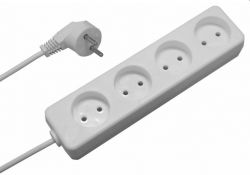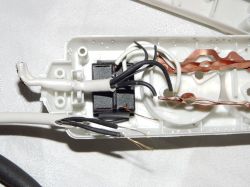Do not you think that Schuko sockets should be used more and more often in Poland? Most European and Euro-Asian countries use Schuko sockets and plugs:
https://en.wikipedia.org/wiki/Schuko#History
The devices equipped with uni-schuko plugs (CEE 7/7) or Europlug (CEE 7/16, CEE 7/17) have been the standard in Poland for many years. Recently, I even bought a cable plug in the shop in the uni-schuko standard, in a form that was used even during PRL, so there should be no problem with migration.
The advantages of Schuko:
- there are no problems with reversing the plug. There is no problem with that, for example, the power supply on the extension cable will not fit. A smaller problem with the fact that, for example, time trials can not be put in the so-called hermetic, because the can must be at the top so you have to break the flap. In addition, they take a second slot in double sockets. The real solution - you need to buy a lot more expensive equipment with a housing at the bottom.
Disadvantages:
- old plugs and devices that remember the times of PRL, originating from the USSR (and so they do not fit into the sockets with a protective pin) and those typically Polish and the French standard do not match.
I would put such sockets next to the usual nests of the French standard in my home and workshop, so that there is always a choice. Nobody is forbidden to do this in my home. Only what would you think about it? Do you use such sockets, have you already convinced them?
https://en.wikipedia.org/wiki/Schuko#History
The devices equipped with uni-schuko plugs (CEE 7/7) or Europlug (CEE 7/16, CEE 7/17) have been the standard in Poland for many years. Recently, I even bought a cable plug in the shop in the uni-schuko standard, in a form that was used even during PRL, so there should be no problem with migration.
The advantages of Schuko:
- there are no problems with reversing the plug. There is no problem with that, for example, the power supply on the extension cable will not fit. A smaller problem with the fact that, for example, time trials can not be put in the so-called hermetic, because the can must be at the top so you have to break the flap. In addition, they take a second slot in double sockets. The real solution - you need to buy a lot more expensive equipment with a housing at the bottom.
Disadvantages:
- old plugs and devices that remember the times of PRL, originating from the USSR (and so they do not fit into the sockets with a protective pin) and those typically Polish and the French standard do not match.
I would put such sockets next to the usual nests of the French standard in my home and workshop, so that there is always a choice. Nobody is forbidden to do this in my home. Only what would you think about it? Do you use such sockets, have you already convinced them?




